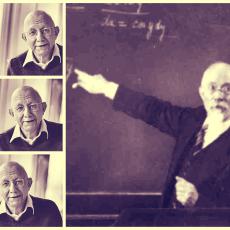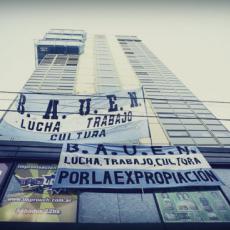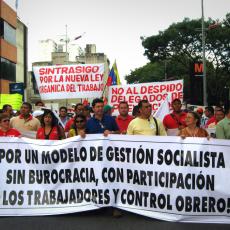Array
-
English01/01/16Maurice Brinton of Solidarity's 1974 critique of the statist left and its definition of worker's control.
Forget for a moment the scare campaigns of the recent elections: Scanlon and Jones presented by the yellow press as proselytisers of red revolution, Mr. Wilson in the garb of a latter-day Kerensky opening the gates to Bolshevism or worse, bank clerks freezing (a la Portuguese) the funds of fleeting fascists, the great fear of the bourgeoisie about a "mafia of fanatical socialists" in control of the commanding heights... of the National Executive of the Labour Party!
The reality is less lurid - and less encouraging. What we see around us is a confident and aggressive movement, increasingly aware of the fact that real power does not lie in Parliament, but profoundly divided as to objectives, strategy and tactics and completely at sea as to values and priorities. So divergent are its component strands that one has to ask, quite bluntly, whether one can legitimately speak of a movement. Among thinking socialists there is a deep malaise.
The purpose of this article is to explore the roots of this malaise, and to show that they lie in the transformations of class society itself. Over the last few decades - and in many different areas - established society has itself brought about the number of the things that the revolutionaries of yesterday were demanding. This has happened in relation to economic attitudes, in relation to certain forms of social organisation, and in relation to various aspects of the personal and sexual revolutions. When this adaptation in fact benefits established society, it is legitimate to refer to it as "recuperation". This article seeks to start a discussion on the limits of recuperation.
Recuperation, of course, is nothing new. What is perhaps new is the extent to which most "revolutionaries" (whether they are demanding "more nationalisation", more "self-management" or "more personal freedom' are unaware of the system's ability to absorb - and in the long run benefit from - these forms of "dissent". Class society has a tremendous resilience, a great capacity to cope with "subversion" to make icons of its iconoclasts, to draw sustenance from those who would throttle it. Revolutionaries must constantly be aware of this strength, otherwise they will fail to see what is happening around them. If certain sacred cows (or certain previous formulations, now found to be inadequate) have to be sacrificed, we'd rather do the job ourselves.
Recuperation of economic demands
Keynesian economic policies, once considered radical threats to bourgeois Society, are today widely accepted as essential to the functioning of modern capital ism. The demands for nationalisation of the mines or railways, for national health insurance, for unemployment benefit and for state pensions have been totally recuperated. Despite occasional nostalgic (and largely irrelevant) glances into the past, no Conservative politician, seeking to retain a shred of credibility, would today advocate the return of the mines or of the railways to private ownership - or the dismantling of the essential structure of the "welfare" state. All socialists would agree, thus far.
But there is then a parting of the ways. We would claim that the centralisation of all the means of production in the hands of the state - the most "radical" demand of the Communist Manifesto - has been achieved in many parts of the world without any corresponding enhancement in the areas of human freedom. In fact an exploit ing society, divided into order-givers and order-takers, functions far better on this type of economic base, which eliminates many of the irrationalities of laissez-faire capitalism. Whatever the human aspirations of their rank and file, the ideologies and programs of Social Democratic, Communist, Trotskyist or Maoist groups in the West provide the most articulate demands for this kind of social organisation. These groups are the midwives of State Capitalism. They may differ as to tempo and as to tactics. They may argue about what they consider to be (for others) the acceptable or unacceptable costs. But their fundamental objective is the same - and is moreover in keeping with the deepest requirements of Capital itself. Pace the ghosts of Hayek and of Schumpeter, pace Enoch Powell and Keith Joseph, the division of society into rulers and ruled will not be abolished by the abolition of the "free market" or, for that mailer, by anything that Messrs. Wilson or Gollan (or the "theoreticians" of any of the Marxist sects) may have in mind.
Moreover all over the Third World (from Sékou Touré's Guinea to North Vietnam, from Iraq to Zanzibar) "Marxist-Leninist" ideas are today influencing the birth and molding the economic life of many developing countries. All are ruthlessly exploitative societies, geared to the rapid development of the productive forces. Today this is only possible on the basis of intense primary accumulation, carried out on the backs of the peasantry. Here again erstwhile revolutionary ideas are becoming vehicles for new forms of enslavement.
To paraphrase Marx, it is not what men think they are doing that matters. What mailers is the objective result of their beliefs and actions. Class society can well recuperate the economic demands of the traditional left. It is not of fundamental importance, in this respect, whether various ruling classes are fully aware of what is happening to them. They clearly differ from one another in the degree of insight they have achieved into their own long-term, historical interests. The more far-sighted among them now accept the centralisation of the means of production in the hands of the State as the essential precondition for the growth of the productive forces. For most Marxist socialists (and for the bourgeoisie) this growth is the fundamental issue. This is what unites them. This is where the bourgeois vision and the Marxist vision coalesce. For both of them economic growth is what politics (and ultimately what life itself) is all about. There are few other dimensions to their thinking. For both of them the future is mainly about "more of the same". And the rest? The rest is for "after the revolution". At best, it will look after itself. At worst, if one speaks to a traditional Marxist about such issues as women's liberation, ecology, the "counter-culture", etc. one is denounced as a "diversionist" in tones showing how deeply the work ethic, patriarchal attitudes and value system of the existing society have permeated their thinking.
Recuperation of institutional forms
Sections of the left have fortunately gone far beyond the demands for nationalisation, planning, etc. In the wake of the Russian Revolution small groups of "left" communists clearly foresaw the course of events which this type of "socialism" would lead to. Slandered by Lenin, denounced by the "orthodox" communists, they warned of what lay ahead: the rule of the party would soon result in the emergence of a new ruling class, based not on the private ownership of the means of production but on a monopoly of decisional authority in all areas of economic, political and social life. To the hegemony of the Party and to the omniscience of its Central Committee the left communist counter-poised the knowledge and power of an enlightened and autonomous working class. They posited the institutional form this power would take: the Workers' Councils. This was no genial blueprint for a new society sucked out of the thumb of a Gorter or a Pannekoek. From the Paris Commune to the Russian Revolution of 1917 the "council" form of organisation had been the living historical product of the class struggle itself. The warnings of these earlier revolutionaries have been fully justified.
But their vision remains limited. Despite Pannekoek's interests in science and philosophy, Ruhle's interest in pedagogy, and Korsch's stress on the need for a deep-going cultural critique, most of the writings of the left communists centered on problems of work and of production and distribution. They lived in a very different era from our own, and had little of significance to say about what have become very important areas of social life: bureaucratization, alienation in consumption and leisure, authoritarian conditioning, the "youth revolt," women's liberation, etc. Even some of their institutional proposals have been partly overtaken by events.
The recuperation of the demand for working class power at the point of production and for a society based on Workers' Councils has, for instance, taken on a particularly sinister form. Confronted with the bureaucratic monstrosity of Stalinist and post-Stalinist Russia, yet wishing to retain some credibility among their working class supporters, various strands of Bolshevism have sought posthumously to rehabilitate the concept of "workers' control". Although "workers' control" was only referred to once in the documents of the first four congresses of the Communist International it has recently become one of the Top Ten Slogans. Between 1917 and1921 all attempts by the working class to assert real power over production - or to transcend the narrow role allocated to it by the Party - were smashed by the Bolsheviks, after first having been denounced as anarchist or anarcho-syndicalist deviations. Today workers' control is presented as a sort of sugar coating to the pill of nationalisation of every Trotskyist or Leninist micro-bureaucrat on the make. Those who strangled the viable infant are now hawking the corpse around. The Institute for Workers' Control even runs annual conferences, addressed and dominated by trade union officials appointed for life. Those who are not prepared to allow workers to control their own organisations here and now serenade sundry simple-tons with fanciful tunes as to their fate in the future. Recuperation here is taking place amid incredible confusion.
For a long time the advocacy of genuine workers control (or, as we prefer to call it, workers' self management) remained confined to small groups of revolutionaries swimming against the great bureaucratic tide. Following the French events of May 1968 the demand took on a new reality and a new coherence. People began to see self-management as the dominant theme (and Workers' Councils as the institutional form) of a new society in which bureaucracy would be eliminated, and in which ordinary people would at last achieve genuine power over many aspects of their everyday life. But this again was to ignore the system's capacity for integrating dissent and harnessing it to its own advantage.
Can the demand for self-management be geared to the requirements of class society itself? An honest answer would be "yes, in some respects". Yes, providing those operating the self-management still accepted the values of the system. Yes, if it remained strictly localised. Yes, provided it was eviscerated of all political content Car assembly plants seeking to obtain the participation of the workers have been operating for some time in the Volvo and Saab factories in Sweden. Under the "with it" guise of enriching the workers' job, employers have continued to enrich themselves. Groups of workers are allowed to manage their own alienation. The powers- that-be seek to resuscitate the anemic institutions of existing society (increasingly abandoned by those expected to make them function) with transfusions of "participation". No wonder the slogan has been taken up by everyone from Gaullist deputies to our own Liberals.
Revolutionaries are in some measures to blame for this confusion of form and content. They have insufficiently warned against the dangers inherent in any attempts at self-management with capitalism. And, in relation to the future, they have insufficiently stressed the limitations of the demand. Self-management and Workers' Councils are means to liberation. They are not liberation itself. Many revolutionaries have, moreover, tended to underestimate the complex problems of society as a whole. These have to be considered in addition to the problems of particular groups of workers. Our vision has never been "the railways to the railway men, the dust to the dustmen". We are not for self-managed insurance empires, for self-managed advertising companies, for the self-managed production of nuclear weapons.
This is not to say that self-management will not be the dominant theme, and the council probably the institutional form of any kind of socialist society. But they are no more than that. Into those particular bottles many wines can be poured. In contemporary society self-management could very well develop on a reformist, racist, nationalistic or militaristic basis. The historical precedents are here. Many Workers' Councils in Germany - in December 1918, and again later on - voted to surrender power to parliamentary institutions. Between 1930 and 1945 the vast majority of the British and German people identified with their respective rulers and mobilised themselves (or allowed themselves to be mobilised) in the defence of interests that were not their own. Israeli self-managed kibbutzim are vehicles for the dissemination of Zionist ideology and for implementing (anti-Arab) discrimination, i.e. anti- socialist policies. In Northern Ireland, amid an "unparalleled explosion of self-management", the self-activity of a civilian population recently brought down a government. . . in the name of sectarian and mystified objectives. The lessons are clear. Self- management, divorced from socialist politics, is meaningless.
Recuperation of "proto-Marxist" demands
Confronted with the fact that established society has successfully co-opted both the economic objectives and some of the institutional prescriptions of those who wanted to challenge it, radicals have responded in a numbers of ways.
One response has been to delve deeper into Marx. The 'communist project' is redefined in proto-Marxist terms. We now have Marx a Jo carte. What is stressed is not what was the historical reality of Marxism (even in Marx's day) but a vision which, although valid, seldom went beyond the realm of rhetoric. The Marx of "the proletarians have no Fatherland" replaces the Marx of the Franco-Prussian war of 1870-71 who supported first Bismarck's armies, then - after Sedan - the forces of the Second Empire. The Marx who denounced the slogan "a fair day's wage for a fair day's work" (arguing instead for "the abolition of the wages system") replaces the more prosaic Marx, manoeuvring among the Lucrafts and the Maltman Barrys in the counsels of the First International. The Marx who thundered that "the emancipation of the working class is the task of the working class itself' erases the pathetic figure of the Marx of 1872, cooking the last congress of the International (the only one he attended in person), inventing non-existing delegations, shifting the venues of future meetings to harass the supporters of the equally authoritarian Bakunin.
But are even these proto-Marxist prescriptions adequate? Is the "abolition of frontiers" any kind of guarantee as to the type of regime that will hold sway over the new, frontier-less expanse? Is the vision of an exploitative society, fusing the techniques of domination of both East and West, just a nightmare dreamed up by the writers of science fiction? Is the abolition of the wage labour any guarantee against exploitation and alienation? Were there not exploitative societies long before wage labour appeared on the historical scene? Wage labour underpins and reinforces hierarchies of power. Its abolition does not necessarily abolish such hierarchies. Class society might even recuperate demands of this kind.
Recuperation of the "personal revolution"
Another response of those confronted with the tremendous recuperative powers of established society has been a tendency to seek individual emancipation, to create in the "here and now" microcosms of the alternative society. Some advocates of this viewpoint see the growth of social freedom as the by-product of the addition of one "free" individual to another, rather like workers going to Ruskin College to become "emancipated one by one". This type of revolt, as long as it is conceived in purely individual terms, can readily be recuperated by established society. Individual revolt, whether in clothing or in hair styles, whether in food preferences or in musical tastes, whether in sexual mores or in philosophical attitudes, readily becomes a commodity to be frenetically exploited in the interests of Capital itself. (The important book The Failure of the Sexual Revolution' by George Frankl, deals with this theme.)
The limits of recuperation
In the Irrational in Politics we wrote that exploiting society would not be able to tolerate "the mass development of critical, demystified, self-reliant; sexually emancipated, autonomous, non-alienated persons, conscious of what they want and prepared to struggle for it". We still hold this idea to be basically correct. Its core, that, one cannot conceive of any genuinely liberatory movement without genuinely liberated individuals seems irrefutable. But our formulation was inadequate. We should have spoken of individuals prepared collectively to struggle for what they wanted. And we should have spoken more about the objectives of the struggle. We should have described more clearly what the vision was, in our eyes at least. The socialist transformation of society is not an automatic process, or a reflex activity. It requires a sense of direction. There may be many roads to the Promised Land but it can surely only help if people know where they are going.
Let us take it for granted that meaningful activity needs to be collective, that social transformation needs emancipated individuals, and that the institutional framework of any new society will probably be based, in part at least, on those forms which the struggle itself has repeatedly thrown up at its moments of deepest insight and creativity. What we now need to think about - and to discuss widely throughout the libertarian left - is the political content of an activity that consciously seeks both to avoid recuperation and to be relevant to the conditions of today.
Are certain yardsticks necessary to define such an activity? I personally think the answer is "yes" - with the proviso that the definition must be seen as an ongoing process. Should revolutionaries who share common objectives group together, first to discuss their objectives and then to fight for them? Again I think the answer is "yes". "Political Inexistentialism" is only relevant if one thinks there is some divine guidance ensuring that every struggle helps move society in a socialist direction.
It is only if libertarians speak openly about these questions that they will be able to present a credible alternative to the authoritarian left. If socialism is the creation of forms of living that will enable all - free from external constraints or internalised inhibitions - to rise to their full stature, to fulfill themselves as human beings, to enjoy themselves, to relate to one another without treading on anybody (and this is as good a definition of socialism as any other) - we should say so loud and clear. And we should not be afraid of criticising any activities - however "self-managed" - that lead in an opposite direction. Socialism, after all, is about a specific way of socialising. In this discussion we must not forget the economic prerequisites of what we seek. Nor must we confuse them with the objective itself. Finally we must not under estimate the forces we are up against, including the recuperative powers of established society. An ongoing reassessment of the degree to which one's former goals have been recuperated is the most effective antidote to the malaise on the left, and the only possible prescription for remaining a revolutionary.
Originally published in Solidarity VII, 12 (November 1974)
Reprinted from libcom.org.
1960-2000 – Εργατικός 'Ελεγχος ενάντια στην Καπιταλιστική Αναδιάρθρωση, Maurice Brinton, Πολιτικά Κόμματα & Εργατικός Έλεγχος, Εργατική Αυτοδιαχείριση, Εργατικά ΣυμβούλιαTopicΝαιΝαιNoΌχι -
English01/01/16A 1996 introduction by the libertarian marxist 'Solidarity' group to Brinton's chronicle of how the bolshevik party undermined soviet power in Russia during the October Revolution.
This pamphlet has two aims. It seeks to contribute new factual material to the current discussion on 'workers' control'. And it attempts a new kind of analysis of the fate of the Russian Revolution. The two objectives, as will be shown, are inter-related.
Workers' Control 'Workers' control' is again being talked about. Nationalisation (whether of the Western or Eastern variety) and the rule of the 'Party of the working class' (whether of the Eastern or Western variety) have manifestly failed. They have not satisfied the hopes and expectations of ordinary people - or given them any real say in determining the conditions under which they live. This has created new interest in the subject of 'workers' control' and in ideas which, in a different context, were common currency at the beginning of the century.
Today people as different as Young Liberals and Labour 'lefts', tired trade union officials and 'Trotskyists' of one kind or another - not to mention anarcho-syndicalists and 'libertarian Marxists' - all talk about 'workers' control'. This suggests one of two things. Either these people have common objectives - which seems unlikely - or the words serve to mask as much as they convey. We hope to dispel some of the confusion by recalling how, at a critical stage of history, the advocates of different conceptions of 'workers' control' confronted one another and by showing who won, why they won, and what the consequences were to be.
This return to the historical roots of the controversy is not motivated by an addiction to archivism or by a partiality for the esoteric. The revolutionary movement in Britain - unlike that in several European countries - has never been much concerned with theory, preferring on the whole an empirical, 'suck-it-and-see' kind of approach. This may at times have helped it avoid becoming bogged down in the swamps of metaphysical speculation but the overhead costs - in terms of clarity and consistency, have been heavy. Without a clear understanding of objectives and of the forces (including ideological forces) impeding advance - in short without a sense of history - the revolutionary struggle tends to become 'all movement and no direction'. Without clear perspectives, revolutionaries tend to fall into traps - or be diverted into blind alleys - which. with a little knowledge of their own past, they could easily have avoided.
The confusion about workers' control (at least in Britain) is partly terminological. In the British movement (and to a lesser extent in the English language) a clear-cut distinction is seldom made between 'control' and 'management', functions which may occasionally overlap but are usually quite distinct. In French, Spanish or Russian political literature two separate terms ('controle' and 'gestion', 'control' and 'gerencia', 'kontrolia' and 'upravleniye') refer respectively to partial or total domination of the producers over the productive process. A moment's reflection will make it obvious why one must make this distinction.
Two possible situations come to mind. In one the working class (the collective producer) takes all the fundamental decisions. It does so directly, through organisms of its own choice with which it identifies itself completely or which it feels it can totally dominate (Factory Committees, Workers' Councils, etc.). These bodies, composed of elected and revocable delegates probably federate on a regional and national basis. They decide (allowing the maximum possible autonomy for local units) what to produce, how to produce it. at what cost to produce it, at whose cost to produce it. The other possible situation is one in which these fundamental decisions are taken 'elsewhere'. 'from the outside', i.e. by the State, by the Party, or by some other organism without deep and direct roots in the productive process itself. The 'separation of the producers from the means of production' (the basis of all class society) is maintained. The oppressive effects of this type of arrangement soon manifest themselves. This happens whatever the revolutionary good intentions of the agency in question, and whatever provisions it may (or may not) make for policy decisions to be submitted from time to time for ratification or amendment.
There are words to describe these two states of affairs. To manage is to initiate the decisions oneself. as a sovereign person or collectively, in full knowledge of all the relevant facts. To control is to supervise, inspect or check decisions initiated by others. 'Control' implies a limitation of sovereignty or, at best, a state of duality of power, wherein some people determine the objectives while others see that the appropriate means are used to achieve them. Historically, controversies about workers control have tended to break out precisely in such conditions of economic dual power.
Like all forms of dual power, economic dual power is essentially unstable. It will evolve into a consolidation of bureaucratic power (with the working class exerting less and less of the control). Or it will evolve into workers' management. with the working class taking over all managerial functions. Since 1961, when 'Solidarity' started advocating 'workers' management of production others have begun to call for 'workers' direct control', 'workers' full control', etc. - so many tacit admissions of the inadequacy (or at least ambiguity) of previous formulations.
It would be a short-sighted view to see in all this a question of linguistic purism, a terminological or doctrinal quibble. We have to pay a ransom to both the past and the present. We have not appeared on the political scene from nowhere. We are part of a revolutionary libertarian tradition for whom these concepts had deep significance. And we are not living in a political vacuum. We are living in a specific historical context. in which a constant struggle is taking place. In this struggle the conflicting interests of different social strata (bourgeoisie, bureaucracy and proletariat) are expressed in different types of demands, more or less clearly formulated. Different ideas about control and management figure prominently in these controversies. Unlike Humpty Dumpty we cannot make words mean exactly what we choose.
The revolutionary movement itself moreover is one of the forces on this social arena. Whether we like it or not - and whether it fully appreciates it or not - most of the revolutionary movement is impregnated with the ethos, traditions and organisational conceptions of Bolshevism. And in the history of the Russian Revolution - particularly between 1917 and 1921 - the issue of 'workers' control' versus 'workers' management' loomed large. 'From 1917 to 1921 the issue of industrial administration was the most sensitive indicator of the clash of principles about the shaping of the new social order. . . It was the most continuous and provocative focus of actual conflict between the communist factions'. (1) And, it should be stressed, between the Bolsheviks and other tendencies in the revolutionary movement. Thousands of revolutionaries were to be killed and hundreds of thousands incarcerated, fighting it out.
Most of those now entering the revolutionary movement will be unfamiliar with these controversies. A virtue should not however be made of this state of affairs. Clarification is essential, but here new problems arise. The methodological poverty, a-historicism (at times even anti-intellectualism) among so many of those revolutionaries who do have some knowledge as to what actually happened is a first tragic obstacle. And it is one of the ironies of the present situation that those others (the residual legatees of Bolshevism) who talk loudest about the 'need for theory' and the 'need to study history' should be those with the most to hide (should their own historical antecedents really be unearthed) and with the most to lose (should a coherent alternative emerge to challenge their ossified beliefs).
Some of the confusion about 'workers' control' is neither terminological nor due to ignorance concerning past controversies. It is deliberate. Today, for instance, one finds some hardened, old-time Leninists or Trotskyists (in the Socialist Labour League, International Marxist Group or in the 'leadership' of International Socialism for instance) advocating 'workers' control' without batting an eyelid. Seeking to capitalise on the confusion now rampant in the movement, these people talk of 'workers' control' as if a) they meant by these words what the politically unsophisticated might think they mean (i.e. that working people should themselves decide about the fundamental matters relating to production) and b) as if they - and the Leninist doctrine to which they claim to adhere - had always supported demands of this kind, or as if Leninism had always seen in workers' control the universally valid foundation of a new social order, rather than just a slogan to be used for manipulatory purposes in specific and very limited historical contexts. (2)
The question of self-management is not esoteric. Its discussion - in the sharpest possible terms - is not sectarian. Self-management is what the revolution of our time is all about. This in itself would justify a pamphlet such as the present one. A study of this period (Russia, 1917-1921) has, however, deeper implications. It could provide the basis for a new kind of analysis of the fate of the Russian Revolution, a task to which we will now briefly turn.
The Russian Revolution
To propose a new way of looking at what happened in Russia in 1917 (and after) is synonymous with an invitation to be misunderstood. If moreover the questions asked and the methodology suggested happen to differ from those in current use the proposal almost becomes a guarantee. As we have had occasion to mention before misrepresentation is a way of life on the traditional left, for whom nothing is quite as painful as a new idea.Over the last 50 years all the existing organisations of the left have elaborated a whole mythology (and even a whole anti-mythology) about the Russian Revolution. The parliamentary fetishists of Social-Democracy see 'the failure of Bolshevism' in its 'antidemocratic practices'. The original sin, for them, was the dissolution of the Constituent Assembly. The self-styled 'communist' movement (Stalinists, Trotskyists, Maoists, etc.) talks with filial pride of the 'glorious, socialist, October Revolution'. They seek to vaunt and popularise its original achievements while differing in their appreciation's of what happened subsequently when it happened, why it happened and to whom it happened. For various anarchists the fact that the State or 'political power' were not immediately 'abolished' is the ultimate proof and yardstick that nothing of fundamental significance really occurred. (3) The SPGB draw much the same conclusion, although they attribute it to the fact that the wages system was not abolished, the majority of the Russian population not having had the benefit of hearing the SPGB viewpoint (as put by spokes men duly sanctioned by their Executive Committee) and not having then sought to win a Parliamentary majority in the existing Russian institutions.
On all sides people seek to use the Russian Revolution with a view to integrating it into their own propaganda - only retaining of it those aspects which happen to conform with their own particular analysis of history, or their own particular prescriptions for the present. What ever was new, whatever seemed to contradict established theories or break out of established categories, has been systematically 'forgotten', minimised, distorted, denied.
Any attempt to re evaluate the crucial experience of 1917-1921 is bound to evoke opposition. The first to react will be the 'apparatchiks' who for years have been protecting 'revolutionary' organisations (and 'revolutionary' ideology) from the dual threats of subversion and renewal. Opposition will also be found however in the minds of many honest militants, seeking the road to genuinely revolutionary politics. One isn't dealing here with a simple psychological resistance but with a much deeper phenomenon which cannot be explained away by reference to the reaction role and influence of various 'leaderships'. If the average militant has difficulty in understanding the full significance of some of the problems raised in the early stages of the Russian Revolution it is because these problems are amongst the most important and difficult (if not the most important and difficult) ever to have confronted the working class. The working class made a revolution that went beyond a mere change in the political personnel at the top. It was able to expropriate the former owners of the means of production (thereby profoundly altering the existing property relations). But to what extent was it able to go beyond even this? To what extent was it able - or prepared - to revolutionise the relations of production? Was it willing to destroy the authority structure which the relations of production embody and perpetuate in all class societies? To what extent was it prepared itself to manage production (and thereby the whole of society), or to what extent was it inclined to delegate this task to others? And to what extent was the dominant ideology to triumph, compelling the working class to substitute for its avowed enemies a Party that claimed to speak 'on its behalf'?
To answer these questions is a major task beset with pitfalls. One of the dangers confronting anyone seeking dispassionately to analyse the 'heroic period of the Russian Revolution' is the danger of 'retrospective identification' with this or that tendency or individual then active on the political scene (Osinsky, Kollontai, Maximov, Makhno or Miasnikov, for instance). This is a pointless political pastime. It leads rapidly to a state of mind where instead of seeking to understand the broad course of events (which is a relevant preoccupation) revolutionaries find themselves asking such questions as 'what should have been done at this or that moment?'; 'was this or that action premature?': 'who was right at this or that Congress?'; etc. We hope to have avoided this snare. When, for instance, we study the struggle of the Workers' Opposition against the leadership of the Party (in 1920 and 1921) it is not for us a question of 'taking sides'. It is a question of under standing what the forces in conflict really represented. What, for instance, were the motives (and the ideological and other limitations) of those who appeared to be challenging the drift to bureaucratisation in every aspect of social life?
Another danger (or another form of the same danger) threatens those venturing into this field for the first time, while still befuddled by the official mythology. It is the danger of becoming entangled in the very legend one is seeking to destroy. Those, for instance, seeking to 'demolish' Stalin (or Trotsky, or Lenin) may successfully achieve their immediate objective. But they may 'succeed' at the expense of not seeing, sensing or recording the most fundamental new features of this period: the autonomous action of the working class seeking totally to alter the conditions of its existence. We hope to have avoided this trap. If we have quoted at some length the statements of prominent individuals it is only insofar as they epitomise the ideologies which, at a given point in history, guided the actions and thoughts of men. Throughout the account, moreover, we have felt that the only way seriously to deal with what the Bolsheviks said or did was to explain the social role of their utterances and actions.
We must now state our own methodological premises. We hold that the 'relations of production' - the relations which individuals or groups enter into with one another in the process of producing wealth - are the essential foundations of any society. A certain pattern of relations of production is the common denominator of all class societies. This pattern is one in which the producer does not dominate the means of production but on the contrary both is 'separated from them' and from the products of his own labour. In all class societies the producer is in a position of subordination to those who manage the productive process. Workers' management of production - implying as it does the total domination of the producer over the productive process - is not for us a marginal matter. It is the core of our politics. It is the only means whereby authoritarian (order-giving, order-taking) relations in production can be transcended and a free, communist or anarchist, society introduced.
We also hold that the means of production may change hands (passing for instance from private hands into those of a bureaucracy, collectively owning them) with out this revolutionising the relations of production. Under such circumstances - and whatever the formal status of property - the society is still a class society for production is still managed by an agency other than the producers themselves. Property relations, in other words, do not necessarily reflect the: relations of production. They may serve to mask them - and in fact they often have. (4)
This much of the analysis is fairly widely accepted. What has not been hitherto attempted is to relate the history of the Russian Revolution to this overall conceptual framework. Here we can only indicate the broad lines of such an approach. (5) Seen in this light the Russian Revolution represents an unsuccessful attempt by the Russian working class to break out of relations of production that were proving increasingly oppressive. The massive upsurge of 1917 proved strong enough to smash the political supremacy of the bourgeoisie (by shattering the economic base on which it was founded: the private ownership of the means of production). It altered the existing system of property relations. But it did not prove strong enough (despite heroic attempts in this direction) to alter the authoritarian relations of production characteristic of all class societies. Sections of the working class (those most active in the Factory Committee movement) certainly attempted to influence the Revolution in this direction. But their attempt failed. It is worth analysing the causes of this failure - and seeing how new masters came to replace the old ones.
What were the forces pitted against those seeking a total transformation of the conditions of industrial life? First, of course, there was the bourgeoisie. The bourgeoisie had everything to lose in such a total social upheaval. Confronted with workers' management, it stood to lose not only its ownership of the means of production but also the possibility of privileged positions vested in expertise and in the exercise of decisional authority. No wonder the bourgeois breathed a sigh of relief when they saw that the leaders of the Revolution would 'go no further than nationalisation' and were keen to leave intact the order-giver/order-taker relationship in industry and else where. True, large sections of the bourgeoisie fought desperately to regain their lost property. The Civil War was a protracted and bloody affair. But thousands of those who, through custom and culture, were more or less closely attached to the expropriated bourgeoisie were very soon offered the opportunity to re-enter the 'revolutionary stronghold' - by the back door as it were - and to resume their role as managers of the labour process in the 'Workers' State'. They seized this unexpected opportunity eagerly. In droves they either joined the Party - or decided to co-operate with it, cynically welcoming every utterance by Lenin or Trotsky in favour of 'labour discipline' or 'one-man management'. Many were soon to be appointed (from above) to leading positions in the economy. Merging with the new political-administrative 'elite', of which the Party itself formed the nucleus, the more 'enlightened' and technologically skilled sections of the 'expropriated class' soon resumed dominant positions in the relations of production.
Secondly, the Factory Committee Movement had to cope with openly hostile tendencies on the 'left', such as the Mensheviks. The Mensheviks repeatedly stressed that as the revolution could only be of bourgeois-democratic type there could be no future in attempts by the workers to manage production. All such endeavours were denounced as 'anarchist' and 'utopian'. In places the Mensheviks proved a serious obstacle to the Factory Committee Movement, but the opposition was anticipated, principled and consistent.
Thirdly - and far more difficult to see through - was the attitude of the Bolsheviks. Between March and October the Bolsheviks supported the growth of the Factory Committees, only to turn viciously against them in the last few weeks of 1917, seeking to incorporate them into the new union structure, the better to emasculate them. This process, which is fully described in the pamphlet, was to play an important role in preventing the rapidly growing challenge to capitalist relations of production from coming to a head. Instead the Bolsheviks canalised the energies released between March and October into a successful onslaught against the political power of the bourgeoisie (and against the property relations on which that power was based). At this level the revolution was 'successful'. But the Bolsheviks were also 'successful' in restoring 'law and order' in industry law and order that re consolidated the authoritarian relations in production, which for a brief period had been seriously shaken.
Why did the Party act in this manner? To answer this question would require a much fuller analysis of the Bolshevik Party and of its relation to the Russian working class than we can here attempt. Again one would have to steer clear both of mythology ('the great Bolshevik Party', 'the weapon forged by Lenin', 'the spearhead of the revolution', etc.) and of anti-mythology ('the Party as the embodiment of totalitarianism. militarism, bureaucracy,' etc.), seeking constantly to understand rather than to rant or rave. At the superficial level both the Party's ideology and its practice were firmly rooted in the specific historical circumstances of Tsarist Russia, in the first decade of this century. illegality and persecution partly explain (although they do not justify) the Party's organisational structure and its conception of its relationship to the class. (6)What is more difficult to understand is the naïveté of the Bolshevik leaders who don't seem to have appreciated the effects that this type of organisation and this type of relationship to the class would inevitably have on the subsequent history of the Party.
Writing of the early history of the Party no lesser an exponent of Bolshevik orthodoxy than Trotsky was to state- "The habits peculiar . . . to a political machine were already forming in the underground. The young revolutionary bureaucrat was already emerging as a type. The conditions of conspiracy, true enough, offered rather meagre scope for such formalities of democracy as elections, accountability and control. Yet undoubtedly the Committee men narrowed these limitations considerably more than necessity demanded. They were far more intransigent and severe with the revolutionary working men that with themselves, preferring to domineer even on occasions that called imperatively for lending an attentive ear to the voice of the masses. Krupskaya notes that, just as in the Bolshevik committees, so at the Congress itself, there were almost no working men. The intellectuals predominated. ''The Committee man'' writes Krupskaya, ''was usually quite a self-confident person . . . as a rule he did not recognise any internal party democracy... did not want any innovations . . . did not desire and did not know how to adapt himself to rapidly changing conditions". (7)
What all this was to lead to was first hinted at in 1905. Soviets had appeared in many places. "The Petersburgh Committee of the Bolsheviks was frightened at first by such an innovation as a non-partisan representation of the embattled masses. It could find nothing better to do than to present the Soviet with an ultimatum: immediately adopt a Social-Democratic programme or disband. The Petersburgh Soviet as a whole, including the contingent of Bolshevik working men as well, ignored this ultimatum without batting an eyelid". (8) Broue, one of the more sophisticated apologists of Bolshevism, was to write that "those in the Bolshevik Party who were the most favourable to the Soviets only saw in them, in the best of cases, auxiliaries for the Party . . . only belatedly did the Party discover the role it could play in the Soviets, and the interest that the Soviets presented for increasing the Party's influence with a view to leading the masses". (9) The problem is put here in a nutshell. The Bolshevik cadres saw their role as the leadership of the revolution. Any movement not initiated by them or independent of their control could only evoke their suspicion. (10) It has often been said that the Bolsheviks were 'surprised' by the creation of the Soviets: this euphemism should not mislead us. The reaction of the Bolsheviks was of far deeper significance than mere 'surprise' - it reflected a whole concept of revolutionary struggle, a whole concept of the relationship between workers and revolutionaries. The action of the Russian masses themselves. as far back as 1905, was already to condemn these attitudes as outdated.
This separation between the Bolsheviks and the masses was to be revealed repeatedly during 1917. It was first witnessed during the February revolution, again at the time of the 'April Theses'. and later still at the time of the July days.(11) It has repeatedly been admitted that the Party made 'mistakes' both in 1905 and in 1917. But this 'explanation' explains nothing. What one should be asking is what made these mistakes possible? And one can answer only if one understands the type of work undertaken by the Party cadres, from the creation of the Party right up to the time of the Revolution. The Party leaders (from those on the Central Committee down to those in charge of local groups) had been placed, through the combined effects of the conditions of the struggle against Tsarism and of their own organisational conceptions, in a situation which allowed them only tenuous links with the real workers movement. "A worker-agitator" wrote Lenin, "who shows any talent and is at all promising should not work in the factory. We must see to it that he lives on Party support . . . and goes over to an underground status". (12) No wonder the few Bolshevik cadres of working class origin soon lost real contacts with the class.
The Bolshevik Party was torn by a contradiction which helps explain its attitude before and after 1917. Its strength lay in the advanced workers who supported it. There is no doubt that this support was at times widespread and genuine. But these workers could not control the Party. The leadership was firmly in the hands of professional revolutionaries. In a sense this was inevitable. A clandestine press and the dissemination of propaganda could only be kept going regularly by militants constantly on the move and at times compelled to seek refuge overseas. A worker could only become a Bolshevik cadre on condition he ceased work and placed himself at the disposal of the Party, which would then send him on special missions, to this or that town. The apparatus of the Party was in the hands of revolutionary specialists. The contradiction was that the real living forces that provided the strength of the Party could not control it. As an institution, the Party totally eluded control by the Russian working class. The problems encountered by the Russian Revolution after 1917 did not bring about this contradiction, they only served to exacerbate it. The attitude of the Party in 1917 and after are products of its history. This is what rendered so futile most of the attempts made within the Party by various oppositions between 1918 and 1921. They failed to perceive that a given ideological premise (the preordained hegemony of the Party) led necessarily to certain conclusions in practice.
But even this is probably not taking the analysis far enough. At an even deeper level the very conception of this kind of organisation and this kind of relationship to the mass movement reflect the unrecognised influence of bourgeois ideology, even on the minds of those who were relentlessly seeking to overthrow bourgeois society. The concept that society must necessarily be divided into 'leaders' and 'led', the notion that there are some born to rule while others cannot really develop beyond a certain stage have from time immemorial been the tacit assumptions of every ruling class in history. For even the Bolsheviks to accept them shows how correct Marx was when he proclaimed that 'the ruling ideas of each epoch are the ideas of its ruling class'. Confronted with an 'efficient', tightly-knit organisation of this kind, built on ideas of this kind, it is scarcely surprising that the emerging factory Committees were unable to carry the Revolution to completion.
The final difficulty confronting the Committees was inherent in the Committee movement itself. Although certain individuals showed extraordinary lucidity, and although the Committee Movement represents the highest manifestation of the class struggle achieved in 1917, the movement as a whole was unable to understand what was happening to it and to offer any serious resistance. It did not succeed in generalising its experience and the record it left is, unfortunately, very fragmentary. Unable to proclaim its own objectives (workers' self-management) in clear and positive terms, it was inevitable that others would step into the vacuum. With the bourgeoisie in full disintegration, and the working class as yet insufficiently strong or conscious to impose its own solutions to the problems tearing society apart, the triumphs of Bolshevism and of the bureaucracy were both inevitable.
An analysis of the Russian Revolution shows that in allowing a specific group, separate from the workers themselves, to take over the function of managing production, the working class loses all possibility of even controlling the means of producing wealth. The separation of productive labour from the means of production results in an exploiting society. Moreover, when institutions such as the soviets could no longer be influenced by ordinary workers. the regime could no longer be called a soviet regime. By no stretch of the imagination could it still be taken to reflect the interests of the working class. The basic question: who manages production after the overthrow of the bourgeoisie? should therefore now become the centre of any serious discussion about socialism Today the old equation (liquidation of the bourgeoisie = workers' state) popularised by countless Leninists, Stalinists and Trotskyists is just not good enough.
In 1917 the Russian workers created organs (Factory Committees and Soviets) that might have ensured the management of society by the workers themselves. But the soviets passed into the hands of Bolshevik functionaries. A state apparatus, separate from the masses, was rapidly reconstituted. The Russian workers did not succeed in creating new institutions through which they would have managed both industry and social life. This task was therefore taken over by someone else, by a group whose specific task it became. The bureaucracy organised the work process in a country of whose political institutions it was also master.
All this necessitates a serious re-evaluation of several basic concepts. 'Workers' power' cannot be identified or equated with the power of the Party - as it repeatedly was by the Bolsheviks. In the words of Rosa Luxemburg, workers' power must be implemented 'by the class, not by a minority, managing things in the name of the class. It must emanate from the active involvement of the masses, remain under their direct influence, be submitted to control by the entire population, result from the increasing political awareness of the people'. As for the concept of 'taking power' it cannot mean a semi military putsch, carried out by a minority, as it obviously does for so many who still seem to be living in the Petrograd of 1917. Nor can it only mean the defence - however necessary - of what the working class has won against attempts by the bourgeoisie to win it back. What 'taking power' really implies is that the vast majority of the working class at last realises its ability to manage both production and society - and organises to this end.
This text is in no sense an economic history of Russia between 1917 and 1921. It is. at best, a selective industrial chronology. In most instances the facts speak for themselves. In a few places, we have taken the opportunity of describing our own views, particularly when we felt that all the protagonists in the great historical debates were wrong, or trapped in a system of ideas that prevented them from appreciating the real significance of what was happening. Events such as the stages of the Civil War are only mentioned in order to place various controversies in context - and to nail once and for all the allegation that many of the measures described were taken 'as a result of the Civil War'.
It will probably be objected that, throughout the narrative, greater stress has been placed on various struggles within the Party than on the actions of the millions who, for one reason or another, never joined the Party or who, from the beginning, saw through what it was endeavouring to do. The 'charge' is true but the shortcoming almost unavoidable. The aspirations of thousands of people, their doubts, their hesitations, their hopes, their sacrifices, their desire to transform the conditions of their daily life and their struggles to do so are undoubtedly as much a moulding force of history as the resolutions of Party Congresses or the speeches of Party leaders. Yet an activity that has neither rules nor statutes, neither tribunes nor troubadours, belongs almost by definition to what history suppresses. An awareness of the problem, however acute, will not generate the missing material. And an essay such as this is largely a question of documentation. The masses make history, they do not write it. And those who do write it are nearly always more concerned with ancestor worship and retrospective justification that with a balanced presentation of the facts.
Other charges will also be made. The quotations from Lenin and Trotsky will not be denied but it will be stated that they are 'selective' and that 'other things, too' were said. Again, we plead 'guilty'. But we would stress that there are hagiographers enough in the trade whose 'objectivity' (like Deutscher's for instance) is but a cloak for sophisticated apologetics. There is moreover another reason for unearthing this material. Fifty years after the Revolution - and long after its 'isolation' has been broken - the bureaucratic system in Russia clearly bears little resemblance to the model of the Paris Commune (elected and revocable delegates, none receiving more than a workingman's wage, etc., etc.). In fact Russia's social structure has scarcely any anticipation in the whole corpus of Marxist theory. It therefore seems more relevant to quote those statements of the Bolshevik leaders of 1917 which helped determine Russia's evolution rather than those other statements which, like the May Day speeches of Labour leaders, were for ever to remain in the realm of rhetoric.
Download Maurice Brinton's pamphlet at the end of this page.
Footnotes
(1) R. V. Daniels. The Conscience of the Revolution, (Harvard University Press, 1960), p. 81.
(2) Not all Trotskyist tendencies practice this kind of deception. Some are unambiguously reactionary. For instance K. Coates and A. Topham state "it seems sensible for us to speak of ''workers' control'' to indicate the aggressive encroachment of Trade Unions (sic!) on management powers, in a capitalist framework, and of ''workers' self-management'' to indicate attempts to administer a socialised economy democratically". (Industrial Democracy in Great Britain, Macgibbon and Kee, 1968, p. 363.) Trotsky himself was just as straightforward. Although not making of workers' control a function to be exercised by the unions he distinguished clearly enough between 'control' and 'management'. "For us the slogan of control is tied up with the period of dual power in production which corresponds to the transition from the bourgeois regime to the proletarian. . . In the language of all mankind by control is understood surveillance and checking by one institution over the work of another. Control may be very active, authoritative and all embracing. But it still remains control. The very idea of this slogan is an outgrowth of the transitional regime in industry, when the capitalist and his administrators can no longer take a step without the consent of the workers, but on the other hand, when the workers have not as yet . . . acquired the technique of management, nor yet created the organs essential for this". (L. Trotsky. What Next? Vital Questions for the German Proletariat, 1932)
(3) An example of such an over-simplified analysis of the fate of the revolution can be found in Voline Nineteen Seventeen (Freedom Press, 1954). "The Bolshevik Party, once in control, installed itself as absolute master. It was quickly corrupted. It organised itself as a privileged caste. And later it flattened and subjected the working class in order to exploit it, under new forms, in its own interests".
(4) For a full discussion of this concept - and of all its implications - see 'Les rapports de production en Russie' by P. Chaulieu, in issue No. 2 (May-June 1949) of Socialisme ou Barbarie. Although the concept may surprise many 'marxists' it is of interest that Engels had clearly perceived it. In his letter to Schmidt (October 27, 1890) he wrote: "In a modern state law must not only correspond to the general economic condition and be its expression, but must also be an internally coherent expression which does not, owing to its inner contradictions, reduce itself to nought. And in order to achieve this, the faithful reflection of economic conditions suffers increasingly. . . The reflection of economic relations as legal principles is necessarily a topsy-turvy one". (Marx Engels - Selected Correspondence, pp. 504-5)
(5) That such an analysis might be possible was suggested in an excellent short pamphlet Notes pour une analyse de la Revolution Russe (n.d.) by J. Barrot. (Obtainable from Librairie 'La Vieille Taupe', I rue des Fosses-St. Jacques, Paris 5).
(6) Both explicitly outlined in the theory (c.f. Lenin: 'What is to be done' and 'One step forwards, two steps back') and in the practice of Bolshevism, between 1901and 1917.
(7) L. Trotsky. Stalin (London, 1947), p. 61. The Congress referred to is the 3rd Party Congress (April 25 - May 10, 1905).
(8) L. Trotsky. ibid., pp. 64-65.
(9) P. Broue. Histoire du Parti Bolshevik. (Editions de Minuit, Paris 1963), p. 35.
(10) The same attitude was to be found within the Party itself. As Trotsky himself was to say, this time approvingly "The statutes should express the leadership's organised distrust of the members, a distrust manifesting itself in vigilant control from above over the Party". I. Deutscher, The Prophet Armed. O.U.P. 1954), p. 76.
(11) No, we are not saying that the military overthrow of the Provisional Government was possible in July. We are merely stressing how out of touch the Party was with what the masses really wanted.
(12) Lenin. Sochineniya, IV, 441.Originally published by Solidarity in 1995.
Reprinted from libcom.org
EraΝαιΝαιNoΌχι -
English31/12/15Located in: Chicago, U.S.A. | Produces: Energy-efficient windows
In 2008, Republic Windows and Doors went bankrupt and was shut down, leaving outstanding debts to the staff. The workers protested through occupations and sit-ins, and a construction company took control of the factory. After the new owner decided to shut down the factory, the workers with the support of the community and funding from 'The Working World' decided to buy out the machinery and start a worker-owned democratically managed cooperative that produces energy-efficient windows.
Website: http://newerawindows.com/
Recommended reading:
Our story. The struggle as told by the workers themselves.
New Era Windows Opens for Business in Chicago Tired of their lives in other people’s hands, window makers started a co-op.ExperiencesΌχιΝαιNoΝαι -
English31/12/15The struggle that led to the creation of the New Era Windows workers' cooperative, as told by the workers themselves.
In 2008, the boss decided to close our windows factory on Goose Island and fire everyone. In 2012, we decided to buy the factory for ourselves and fire the boss. We now own the plant together and run it democratically. This is our story.
In 2008, after many decades of operation, Republic Windows and Doors went bankrupt and was shut down. This seemed odd as the windows business appeared profitable. Meanwhile, members of the family business opened new windows factories in Chicago, hiring workers through temp agencies. They were also investigated by authorities over irregularities in their bankruptcy and were sued by banks over outstanding debts. It seemed the reason workers were losing their jobs might not be because they weren't doing profitable work.
When the announcement to close the plant was made, the workers were told that their jobs would be terminated immediately, and that they would not be given their contractually obligated backpay or severance. While workers were being fired, banks were being bailed out for having taken on too much risk in the pursuit of profits. The workers decided to occupy the factory in protest, and the community came out in extraordinary numbers to support them. See the Michael Moore Short about it.
The workers and the community won enough of this struggle to get the money that was owed to them. A new green construction company, Serious Energy, took control of the factory and partially reopened it. Things seemed to have turned around.
Unfortunately, Serious Energy's business plan, which only involved the windows factory in a tertiary role, never functioned, and the company had to severely cut back on its operations, including closing the factory. Once again, the workers, despite their profitable work, found themselves being sacrificed in a financial game they did not control.
Everyone decided enough was enough. If we want to keep quality manufacturing jobs in our communities, perhaps we should put in charge those who have the most at stake in keeping those jobs — the workers. The plan to start a new worker owned cooperative business began.
The workers called in help in the form of the United Electrical Workers Union, whom had been with them since the beginning, The Working World, which had worked with dozens of worker controlled factories in Latin America, and the Center for Workplace Democracy, a new organization in Chicago dedicated to supporting worker control.
With tremendous support from the community, The Working World raised the investment needed for the workers to buy their factory. Unfortunately, the workers weren't being given a place at the negotiating table, and even that right had to be fought for as workers marched in front of investment banks and signatures poured in to support the workers. Finally, the workers were allowed in, and a deal was struck to allow the workers to buy what they needed to run their own factory.
Today, we are putting that new cooperative business together, and we have decided to call it New Era, as we hope it will be an inspiration for how future jobs can be created in America. Everyone can participate in building the economy we all want, and no one should be treated as temporary or just raw material for someone else's business.
We have built the highest quality windows ever made in Chicago, ones that are soundproof and extremely energy efficient, meaning they are both green and save money. Our windows will be the best on the market at prices no one can beat.
Sales aim to begin early 2013. We are striving to support our community, to keep quality jobs in America, and make our economy stronger. Please support us and check out our windows. We know you'll love them, and please recommend them to a friend if you do.
If we can work together, as we are proving we can, we strongly believe the future could be brighter than ever.
Reprinted from the website of New Era Windows.
New Era Windows, New Era Windows, Καταλήψεις Χώρων Εργασίας, Εργατική Αυτοδιαχείριση, 21ος αιώνας – Εργατικός Έλεγχος στη Σύγχρονη Εποχή, Η.Π.Α., Βόρεια ΑμερικήExperiencesΝαιΝαιNoΌχι -
English31/12/15Located in: Milan, Italy | Activity: Household appliances recycling
Transnational car parts producer Maflow was sold to an investor who shut down the plant in December 2012 removing most of the machinery. In February 2013 former Maflow workers occupied the plant, together with precarious workers and workers from a nearby factory closed after fraudulent bankruptcy. The 20 workers participating full time in the project started recycling computers and electronic household devices, opened a bar and cafeteria and organized a flea market, cultural activities and a group for solidarity shopping. They plan to transform the factory into a plant for industrial recycling.
Website: http://www.rimaflow.it/
Recommended reading:
Occupy, Resist, Produce - RiMaflow. A documentary about the struggle.
When Workers Takeover: From Redundancy to Ri-Maflow
All photos by Andrés Lofiego

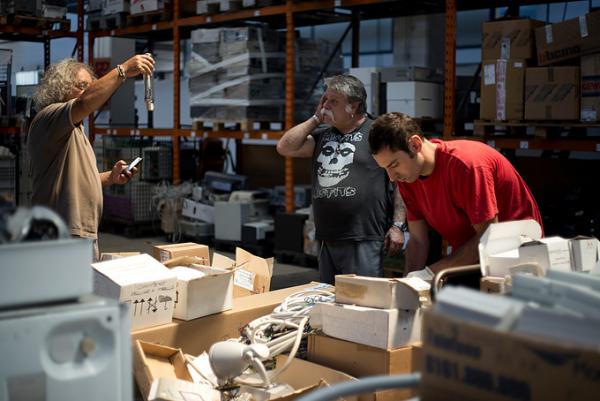

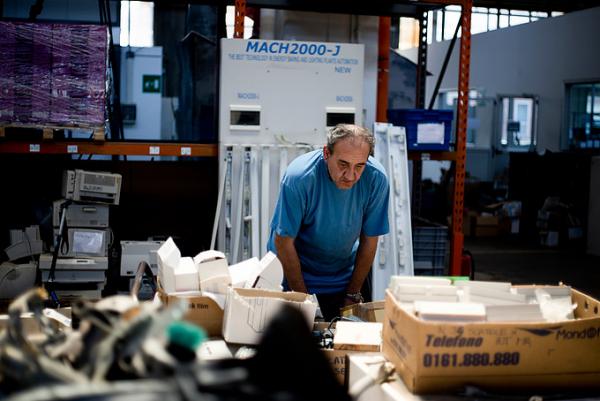
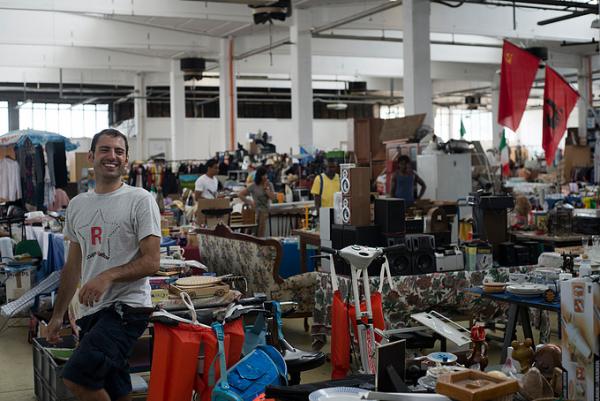
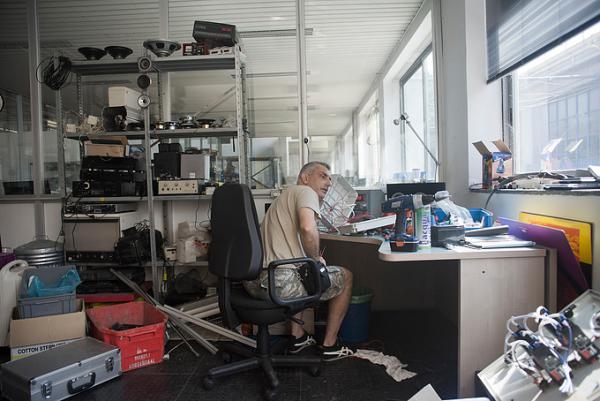
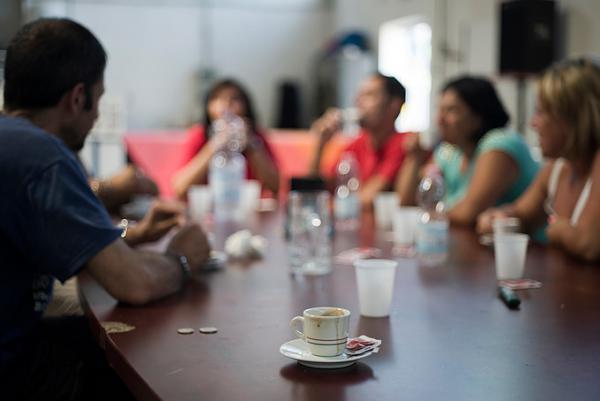 ExperiencesΌχιΝαιNoΝαι
ExperiencesΌχιΝαιNoΝαι -
English30/12/15Located in: Thessaloniki, Greece | Produces: Natural detergents and soaps
VIOME is a building materials factory in Thessaloniki, Greece, which was abandoned by its owners at the peak of the Greek crisis, in 2011. Subsequently it was occupied by its workers, and has been producing natural detergents under workers' control since 2013.
Legal status: The workers formed a cooperative in April 2014. As of December 2015 there is an auction process for the liquidation of the company assets.
Website: www.viome.org
Email: viomesynergatiki@yahoo.gr
Recommended reading:
Occupy, Resist, Produce – VIOME. A 30-minute long documentary that recounts the struggle of VIOME for self-management through interviews and participation in its assemblies.
Vio.Me: workers' control in the Greek crisis. A brief summary of the VIOME struggle written in May 2014.
All photos by Andrés Lofiego
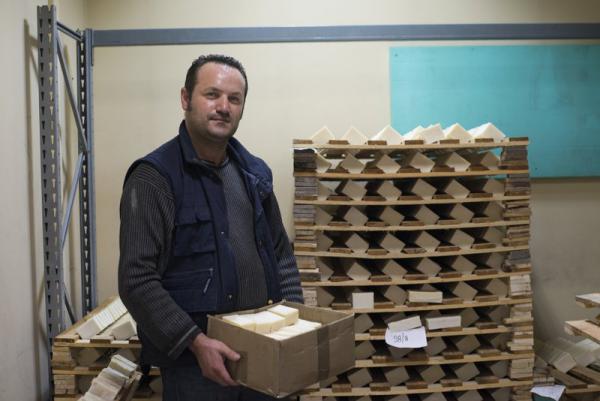
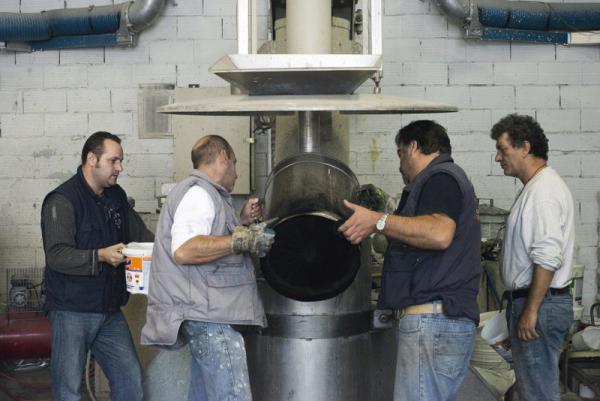
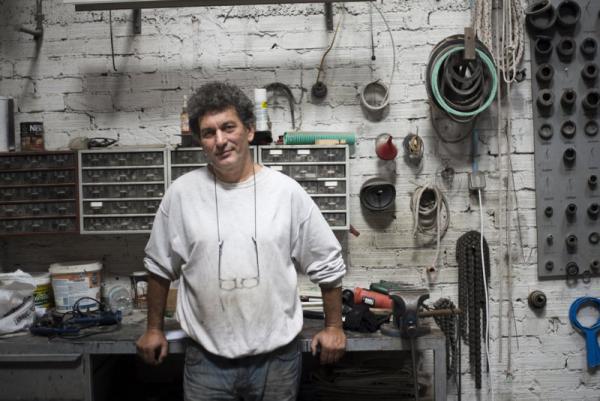
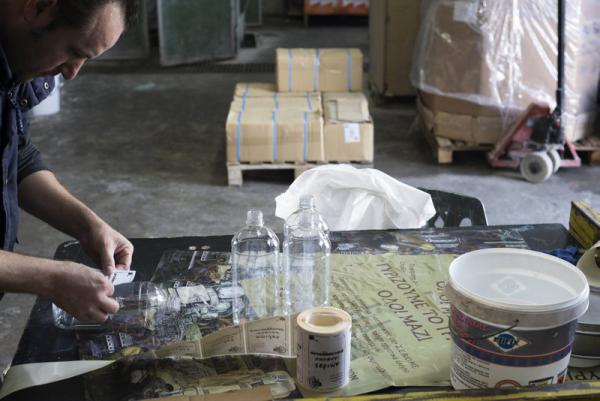
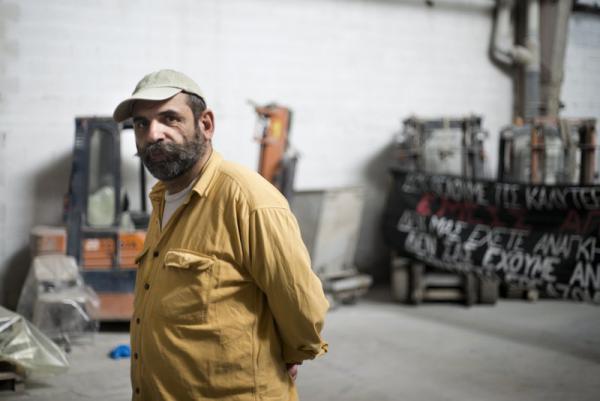
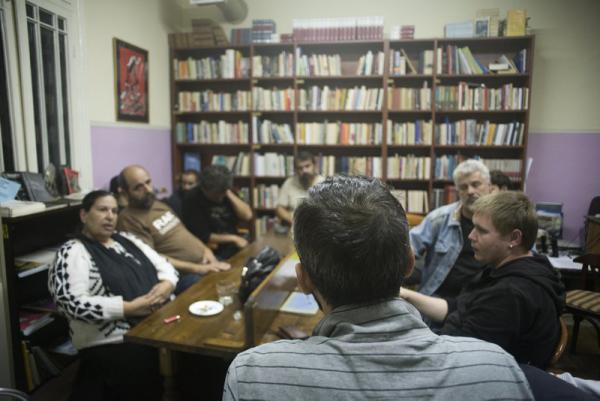
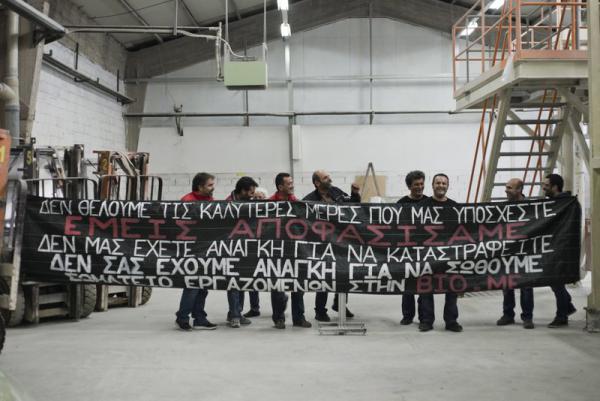 ExperiencesΌχιΝαιNoΝαι
ExperiencesΌχιΝαιNoΝαι -
English30/12/15The workers of Fralib sing about their struggle.
"Thé de l'Eléphant was born in Provence, it must stay in Provence"
The workers of Fralib (the Elephant Tea) in Géménos spent 1336 days of struggle against Unilever, the giant multinational behind the Lipton brand. Their collective strength finally managed to make the multinational cave in, and thus SCOPTI coop was born. Their struggle is recounted here by the workers themselves, in French, to the rhythm of the Los Fralibos protest song.
Year: 2013 | Length: 3:46
Recorded and filmed at Studio K
Musical Director: Meddhy Ziouche
Image: Claude Hirsh
Editing: Audrey Vernon
Ταινίες & Πολυμέσα, Fralib, Los Fralibos, Ανακτημένες Επιχειρήσεις, Εργατική Αυτοδιαχείριση, 21ος αιώνας – Εργατικός Έλεγχος στη Σύγχρονη Εποχή, Γαλλία, ΕυρώπηExperienceshttps://www.youtube.com/embed/A3KqeXcgy4wΝαιΝαιNoΌχι -
English30/12/15A video clip by Greek militant hip-hop collective Social Waste, filmed at the recuperated factory of VIOME.
Captions available in English, Spanish, Italian, Greek.
The video clip was shot at the occupied, self-managed factory of VioMe in Thessaloniki. It includes shots from the Festival for the Water of Thessaloniki that was organized by Water Warriors in December 2013.
Social Waste would like to thank the general assembly of the workers of VioMe for the hospitality and the participation in the videoclip.
Director: Dimitra Karyotaki https://www.facebook.com/dimitra.kary...
Photography: Manos Cizek http://www.imdb.com/name/nm5241062/
Scratch (Video Clip): Vaggelis(DST8)
Lyrics, Presentation: Leonidas
Produced by: DXR, Rizikos
Bass: Stelios Mpotsaris
Scratch: DJ Stigma
Year: 2013
Mixing & mastering by Los Angelos (Dj Stigma) @ GroundZero sound & design
https://www.facebook.com/Dj.Stigma
http://www.groundzero.grOfficial Website: http://www.socialwaste.org
Facebook : https://www.fb.com/Social.Waste.Official
Twitter: http://www.twitter.com/infosocialwaste
Download Album (MP3): http://socialwaste.org/mp3fullabum256...
Download Album (Flac): http://socialwaste.org/flacfullabumYear: 2013 | Duration: 4:23
Director: Dimitra Karyotaki
Photography: Manos CizekΤαινίες & Πολυμέσα, Ανακτημένες Επιχειρήσεις, Κοινωνικοί Αγώνες, Social Waste, VIOME, Εργατική Αυτοδιαχείριση, 21ος αιώνας – Εργατικός Έλεγχος στη Σύγχρονη Εποχή, Ελλάδα, ΕυρώπηExperienceshttps://www.youtube.com/embed/y5ycGW1sFagΝαιΝαιNoΌχι -
English30/12/15The second in a series of short documentaries on the recuperated factories of Europe.
Officine Zero, former RSI (Rail Service Italia) was dedicated to the maintenance and repair of sleeping cars. When in December 2011 Italian train services decided to stop the night train service and invest in fast track trains, RSI closed. Some 20 workers out of the almost 60 employees strong work force did not accept the closing and took up the struggle. They found support among the activists from the nearby social center, “Strike.” In February 2012 they occupied their work place. Together they started a laboratory on reconversion, organizing public assemblies attended by hundreds of people. The “crazy idea” of the Officine Zero was born. Precarious workers, independent workers, craftsmen, professionals and students joined the occupation. The mixture between old and new work forms, bringing together different precarious work situations, trying to overcome isolation and individualization is an important core idea of the project.
On 2 June 2013, Officine Zero was officially founded as an eco-social factory. Officine Zero means literally “workshops zero”: “zero bosses, zero exploitation, zero pollution”, as their new slogan says. The name also points out that they had to find a new starting point. “That was the idea of putting together a workplace without bosses,” Miriam Freschi explains in the film, who joined OZ coming from the social center, “the idea of reuse and recycle wasn't just a new way of working, but also a way to invent a new system.”
In half a dozen workshops as carpentry, padding, metal works and general repairs the workers at Officine Zero dedicate themselves mainly to recycling domestic appliances, computers and furniture. The common project is to turn the former sleeping car repair facility into an industrial reuse and recycle center. OZ is administrated horizontally by all workers, from the workshops together with the precarious workers sharing an office floor in the former administration building. Former RSI worker and head of the padding workshop Giuseppe “Peppe” Terrasi underlines the democratic decision making: “We do it with assemblies, assemblies we all take part in, and not in closed assemblies where some people know what is happening and others don't”. Metal worker Guido Abballe, main responsible of metal works and welding shop makes clear that OZ is about more than just defending a work place: “The reason we are here, that we are growing and luckily, though with many difficulties, we are carrying on is that we are trying to find a new system, a new way”.
“Occupy, Resist, Produce – Officine Zero” follows the workers’ activities, discussions and initiatives to gain back work, income and dignity by building a democratic and self-determined work place.
After “Occupy, Resist, Produce – RiMaflow” (34 min., 2014) the film “Occupy, Resist, Produce – Officine Zero” is the second in a series of short films on occupations of workplaces and production under workers' control in Europe.
Directed and produced by Dario Azzellini and Oliver Ressler
Camera: Thomas Parb
Additional camera: Bernhard Mayr
Boom operator: Roberto Polenta, Oliver Ressler
Film editors: Dario Azzellini and Oliver Ressler
Sound design, re-recording mix and color correction: Rudolf Gottsberger
Special thanks to: Alioscia Castronuovo, Elisa Gigliarelli, Francesco Raparelli and Marina Sitrin
The project was funded partly through support of the Austrian Science Fund (FWF) AR 183-G21.
Co-production: Neuer Berliner Kunstverein (n.b.k.)
Thanks for support to the Johannes Kepler University Linz, Austria
Year: 2015 | Duration: 33'
This is the second in a series of short documentaries on the recuperated factories of Europe made by militant film-makers Dario Azzellini and Oliver Ressler.
1. Occupy, Resist, Produce - RiMaflow
2. Occupy, Resist, Produce – Officine Zero
Ταινίες & Πολυμέσα, Dario Azzellini, Officine Zero, Oliver Ressler, Ανακτημένες Επιχειρήσεις, Κοινωνικά Ωφέλιμη Παραγωγή, Εργατική Αυτοδιαχείριση, 21ος αιώνας – Εργατικός Έλεγχος στη Σύγχρονη Εποχή, Ιταλία, ΕυρώπηExperienceshttps://www.youtube.com/embed/WiU6pCKj2MQΝαιΝαιCurrent DebateΌχι -
English30/12/15The third in a series of short documentaries on the recuperated factories of Europe.
VIOME is a building materials factory in Thessaloniki, Greece, which was abandoned by its owners at the peak of the Greek crisis, in 2011. Subsequently it was occupied by its workers, and has been producing natural detergents under workers' control since 2013. Despite being an emblematic and inspiring struggle, today VIOME is under imminent threat of eviction. Find out how you can get involved and be part of the struggle at viome.org.
You are free to organise screenings in your town and use this film for any non-commercial purpose.
The closing video clip is "At utopia's fiesta" by Greek militant hip-hop collective Social Waste. It was filmed at the factory of VIOME.
See the full version here:
http://www.workerscontrol.net/authors/social-waste-utopias-fiesta
Year: 2015 | Duration: 30'
This is the third in a series of short documentaries on the recuperated factories of Europe made by militant film-makers Dario Azzellini and Oliver Ressler.
1. Occupy, Resist, Produce - RiMaflow
2. Occupy, Resist, Produce – Officine Zero
3. Occupy, Resist, Produce – VIOME
Ταινίες & Πολυμέσα, Dario Azzellini, Oliver Ressler, Ανακτημένες Επιχειρήσεις, Κοινωνικά Ωφέλιμη Παραγωγή, VIOME, Εργατική Αυτοδιαχείριση, 21ος αιώνας – Εργατικός Έλεγχος στη Σύγχρονη Εποχή, ΕλλάδαExperienceshttps://www.youtube.com/embed/2Fg2akSUvFMΝαιΝαιCurrent DebateΌχι

